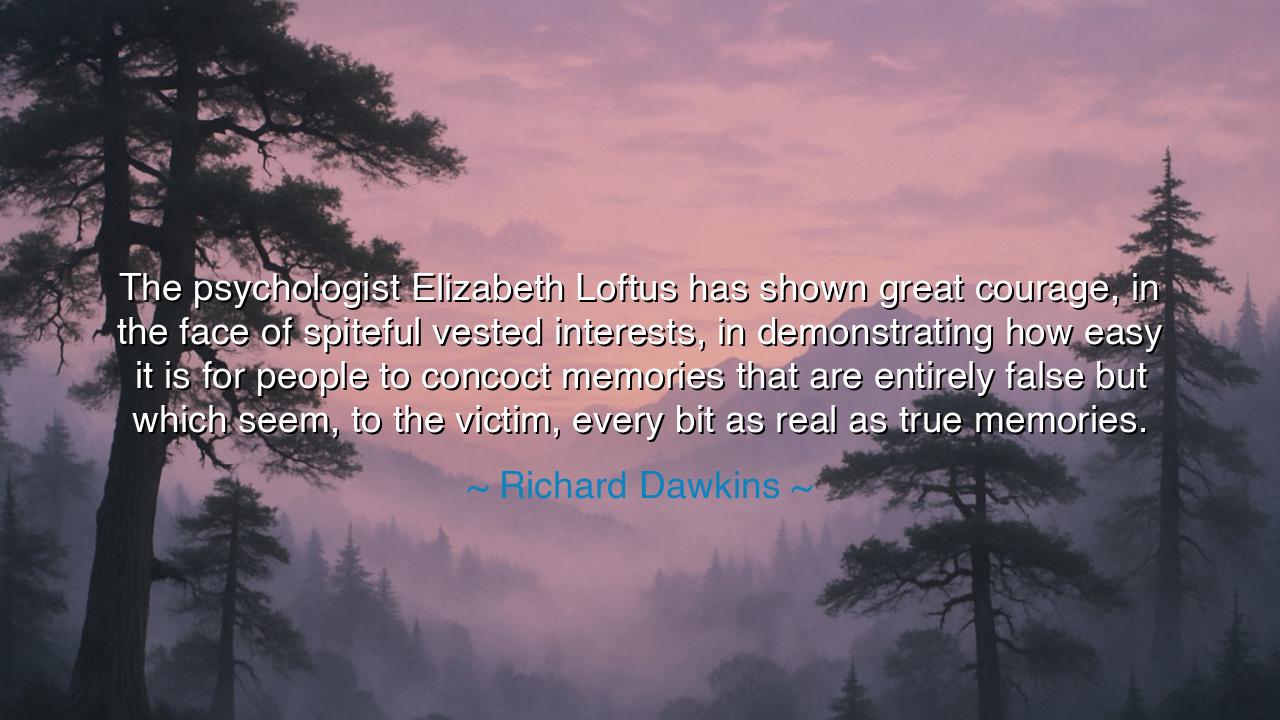
The psychologist Elizabeth Loftus has shown great courage, in the
The psychologist Elizabeth Loftus has shown great courage, in the face of spiteful vested interests, in demonstrating how easy it is for people to concoct memories that are entirely false but which seem, to the victim, every bit as real as true memories.






Hear now the words of Richard Dawkins, who spoke not only as a scientist, but as a guardian of truth in an age of illusion: “The psychologist Elizabeth Loftus has shown great courage, in the face of spiteful vested interests, in demonstrating how easy it is for people to concoct memories that are entirely false but which seem, to the victim, every bit as real as true memories.” These words shine a light upon the fragile kingdom of the human mind—a realm where truth and falsehood may wear the same face, and memory itself, once trusted as sacred, can become a trickster spirit.
Elizabeth Loftus, a scholar of extraordinary resolve, dared to question what others treated as holy: the reliability of human memory. She discovered that the mind, though wondrous, is not an iron vault but a living field—fertile and vulnerable. A single seed of suggestion, planted in fertile soil, can grow into a towering illusion. In her studies, she showed how people could be led to “remember” events that never occurred, to weep over shadows that had never been cast. Yet her discovery, though vital for justice and truth, provoked anger and resistance, for it threatened the foundations upon which courts, testimonies, and personal identities were built.
To reveal such a truth requires courage, the kind found not in swords or banners, but in intellect and integrity. For Loftus stood before the fury of those who preferred the comfort of false certainty to the discomfort of reality. Her battle was not waged in fields of blood, but in the arena of thought, against the mighty forces of fear, pride, and ideology. She taught the world that even the most heartfelt memory can deceive, that even the most sincere witness may be wrong. This, to many, was heresy—for who among us wishes to believe that our own mind might betray us?
Yet her work recalls a timeless truth known to the ancients: that human perception is a fragile mirror, reflecting not the world as it is, but as we believe it to be. The philosopher Plato warned of the cave, where men mistake shadows for reality. The mystics of the East spoke of Maya, the grand illusion that veils the true nature of existence. Loftus, in the language of science, renewed this ancient wisdom for our age—showing that illusion does not merely dwell in the stars or dreams, but within the folds of our very consciousness. The false memory is the modern shadow on Plato’s wall.
Consider the tale of Salem, in the 17th century, where hysteria swept through a small village and countless souls were condemned by testimony born not of truth but of delusion. The accusers, trembling with conviction, believed utterly in their visions of witchcraft and evil. Their memories felt real, their fear sincere—yet they were wrong. Innocent lives were taken because men trusted emotion over evidence, recollection over reason. Had Loftus lived in those days, her voice would have been branded as dangerous—but her wisdom might have spared them their madness.
Thus, Dawkins honors her as a warrior of truth, one who faced spiteful vested interests—those who profit from deception, from the sanctification of ignorance. Her example reminds us that truth is often lonely, and that those who defend it must walk through the valley of scorn. But such is the cost of enlightenment. To see clearly is to stand apart from the crowd; to speak truth is to invite the wrath of those who cling to comforting lies.
Let the lesson of this teaching echo within your own heart: do not trust every memory, for even the sincerest vision may be woven from smoke. Seek always the light of evidence, the discipline of doubt, the humility to question yourself. When you hear another’s story, listen with compassion, but test it with wisdom. When your mind whispers of certainty, pause and ask, “Is this truth—or the echo of belief?” In this way, you honor the spirit of Elizabeth Loftus—the seeker who dared to look into the heart of memory and found both its brilliance and its betrayal.
So, children of thought, remember: truth demands courage, for it asks us to question even what feels sacred. The mind is both a gift and a deceiver, a poet and a trickster. Guard it, but do not worship it. Be lovers of truth, not of comfort. For in the end, as Dawkins reminds us, those who defend reality against illusion—whether in science, in spirit, or in self—are the true heroes of humanity’s long and perilous awakening.






AAdministratorAdministrator
Welcome, honored guests. Please leave a comment, we will respond soon